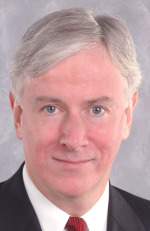Dr. Stephen Jones is director of the Center for Healthy Aging at Greenwich Hospital, which is a member of the Yale New Haven Health System. He spoke recently with the Fairfield County Business Journal about issues impacting senior health care, including a shift toward improved services as 10,000 baby boomers per day reach age 65. The center serves the tristate region, including Westchester County, N.Y., which provides 50 percent of its patients.
The Center for Healthy Aging received an Excellence in Geriatrics Care Award from the American Geriatrics Society”™s Foundation for Health in Aging. If I am a patient, are the accomplishments leading to the award evident?
“The Center for Healthy Aging is really about true customer service,” Jones said. “There is a time commitment to family members as well as to clients. It consists of unrushed analysis and assessment by a whole team.” He ticked off specialists who routinely participate in such assessment/analysis: “Neuro-psychiatrist, pharmacist, geriatric physician, speech pathologist … the whole gamut.”

You are a personal fan of humor. Can a levity factor be quantified beyond the “laughter is the best medicine” adage?
“When humor is used correctly, it can be extremely powerful,” Jones said. “It has benefits not just for healing but in promoting better communication.” But, he said, the levity is not necessarily of the ha-ha variety and a long-ranging conversation with Jones elicits no rimshot-worthy riffs on the weather, in-laws or lawyers. Rather, he uses humor as a “powerful enhancer” of trust, credibility and confidence, he said. “It”™s not goofy, all-out silliness,” he said. Even bad news offers room for a smile: “It can be a distractor when used very carefully and with sensitivity. I am a big fan of humor.”
You offer an aging assessment that lasts a couple of hours. Is this a new idea? Is the focus physical or cognitive?
“This is a new idea,” he said, adding, “Geriatrics is a relatively new science.” He said the assessments date to the 1990s. “It takes more than two hours when it is done right, examining every component of life. One reason it takes longer than for, say, an 18-year-old is that an 80-year-old has a lot of medical history. It is a challenging process.””¨Jones said a person today on average will live to see 80, a 30-year leap in a century. The word “geriatric,” he explained, was coined by a 1906 medical student. “It”™s Greek for ‘old man.’ We try not to use it at the Center for Healthy Aging.”
You address geriatric psychiatric issues via a staff that includes a board-certified geriatric psychiatrist, licensed clinical social workers and a nurse practitioner. On a scale of 1-5 ”“ 1 being little interest and 5 a lot of interest ”“ chart the last decade regarding interest in geriatric psychiatry.
“It’s a six,” he said, exceeding the scale. “Alzheimer’s is not a normal part of aging. But the probability of it happening increases as we get older. Cognitive issues and depression are major parallel issues. The field of geriatric psychiatry is an offshoot of general psychiatry. It is very important and it is very much growing.” Citing the number 10,000 as the number of baby boomers who reach 65 each day, he said they face a 3 percent to 5 percent chance of developing Alzheimer’s at that point, but 20 years later the number is 40 percent to 50 percent.
The baby boomers who fought in or protested Vietnam, surfed and rocked out are graying. This generation loved to oppose its parents. How will the aging experiences of the boomers and their parents differ?
“The baby boomers have changed the face of America: economically, socially and medically. With 10,000 born every day, they drove the economy. They drove social issues. And they drove medical advances. Their expectations for aging are different. They expect a certain quality of life. It’s going to be interesting; it’s certainly going to be different than our parents.”
Besides full assessments and psychiatric exams, the center offers family caregiving consultations with a licensed clinical social worker, in the center’s words, “to enable caregivers to adequately address concerns and make knowledgeable decisions.””¨The center also runs spouse and family support groups and a program called Generations, for those over 50, that mixes discounts on medicine and insurance and even car rentals with educational seminars.
This article has been corrected to reflect that the Center for Healthy Aging received an Excellence in Geriatrics Care Award from the American Geriatrics Society”™s Foundation for Health in Aging. A previous version of this article misstated the award.


















Great report. Here’s something very simple for you and for Dr. Jones. I left this as comment on a story in the WCBJ.
Here’s another way to look at it. I cover this during my seminars on retiree healthcare.
76 million baby boomers in America:
According to the Department of Health & Human Services: 70% of all Baby Boomers will need some form of LTC in retirement and 25% are expected to have to stay in a nursing facility for at least 3 years.
According to Kaiser Foundation:
15,465 nursing facilities. 1,646,302 beds in the facilities. 1,366,390 beds occupied in the facilities. That means there are 279,912 beds available in nursing facilities throughout the country. How may Baby Boomers?????